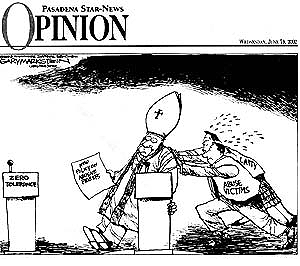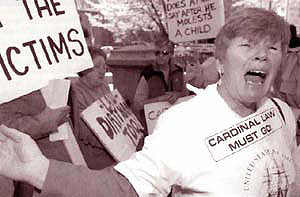 |
The Pedophile Crisis
Analysis of the Vatican on Pedophile Abuses
The Common Good and the Criminal
Atila Sinke Guimarães
Public opinion was shaken by another surprise coming from this every-day-more-surprising Vatican. On October 14 Cardinal Giovanni Battista Re, Prefect of the Congregation for the Bishops, issued a letter to the American Prelates on the pedophilia crisis in the United States. More precisely, the letter criticized two documents approved late June in Dallas by the American Bishops as a common statement to save the reputations of the Prelates who had been accused of covering the abuse of minors committed by countless priests. The documents are: Charter for the Protection of Children and Essential Norms for Diocesan Policies.
1. Ambiguity in the Dallas statement
The Dallas documents were a good beginning since they acknowledged the previous improper policy of the Bishops covering for the guilty priests. They expressed intentions to resolve the crisis of pedophilia, to punish the culpable priests with the dispensation of the use of holy orders, and to open up information on sexual abuse of minors either to the civil authority or lay parties with interests in the cases. All of these good intentions, however, along with the correspondent norms, were left in the air because the definition of pedophile abuse that was given in the statement was totally vague. I am referring to this part:
"Sexual abuse (includes) contacts or interactions between a child and an adult when the child is being used as an object of sexual gratification for the adult. A child is abused whether or not this activity involves explicit force, whether or not it involves genital or physical contact, whether or not it is initiated by the child, and whether or not there is discernible harmful outcome” (Charter for the Protection of Children, Article 1, Note 1, Origins, June 27, 2002, p. 106).
What is the precise meaning of the expression “being used as an object” applied to an adult-child relation? According to modern ecclesiastical language, “to use someone as object” means to act egotistically toward that person. Therefore, in this case, would it mean that the adult’s action is reproachable because it is egotistical or self-interested? Then, if the adult would approach the child not as an object, but with a disinterested love, would this count as sexual abuse? Yes? Why? This action doesn’t fit within the boundaries of the given definition.
What does “sexual gratification” means? Would a caress, an embrace, or a kiss that are not strictly sexual acts be included in the concept of “sexual gratification’? If they are not included, are they permitted then? And if they are, why are they included since the concept of “sexual gratification” does not apply to these acts? Again, the expression is inadequate to catch the reality. These are just a few points to show how the first sentence is incomplete and imprecise. The second sentence of the above-quoted paragraph is still more imprecise. In fact, it is so vague that is difficult even to make a critique.
This definition, notwithstanding, is considered the very core of the two Dallas documents, the criterion to establish someone as either innocent or guilty of the crime of pedophilia. Given the absolute imprecision of the definition, how can the proper authorities uniformly judge ecclesiastics as innocent or guilty of sexual abuse by applying this paragraph? It is not possible. Each Bishop can interpret it the way he wants. Given that the definition is vague, the proposed punishments do not have conditions to be seriously applied. Everything is still in the air. In short, from a juridical point of view, the criteria established by the Bishops at Dallas did not provide remedies to cure the crisis of pedophile abuse.
Many Bishops left Dallas talking loudly about “zero tolerance.” This expression, until a precise definition is made, does not have any serious juridical base. It seems to be a mere slogan repeated over and over only to impress public opinion.
2. The Vatican position on the topic
The recent letter signed by Cardinal Re gave three arguments against the statement, arguments that I will place in a different order from how they appear in the letter.
 | 
The Dallas charter was a response
to Catholic demands - Pasadena Star News, June 19, 2002 |
A. It objected to the vagueness and imprecision of the text in the Bishops’ statement and pointed out the need to correct it. On this point, I agree without any difficulty. A commission composed of Vatican officials and American Bishops was established to present a new project to a general meeting of the Bishops that will take place in November.
B. It indirectly implied that the American document was very rigorous against the abuser-priests. Here is the text of Cardinal Re’s letter: “Deeply moved by the suffering of the victims and their families, the Holy See supports the American Bishops in their endeavor to respond firmly to the sexual misdeeds of the very small number of those who minister or labor in the service of the Church. But such a very small number cannot overshadow ‘the immense spiritual, human and social good that the vast majority of priests and religious in the United States have done and are still doing’ (John Paul II, April 23, 2002)” (Vatican Internet Site).
C. It implicitly took up the defense of the priests accused and convicted of pedophilia when it stated: “The policies adopted at the Plenary Assembly in Dallas can be the source of confusion and ambiguity, because the Norms and the Charter contain provisions which in some aspects are difficult to reconcile with the universal law of the Church” (ibid.).
Since I agree with the first argument that accuses the Dallas statement of being “vague and imprecise,” I will answer the two subsequent ones (Item 4, below). But first, let me present an enormous presupposition that the Vatican is skipping over in its position (the following Item 3).
3. The role of the authority and the law
In any society that follows natural law, the role of the authority and the laws is to uphold the common good. Salus populi, suprema lex (the good of the whole society ought to be the supreme law), says the well-known juridical aphorism that forms the base of any law.

An indignant public demands a rigorous law to punish the guilty - Catholic World Report, June 2002 |
What is the common good with regard to the topic of pedophilia? It is to defend the Catholic Church as an ensemble against the spreading of this despicable vice that calls to Heaven for vengeance. To make an effective defense, the Vatican should support a very rigorous law to punish the guilty, and thus discourage others from following the infamous example of pedophile priests. This would be the normal way to restore the honor and health of the Catholic Church in the United States. It would also preserve the union among the faithful and Prelates, which was seriously damaged by the wave of scandals and complacent position assumed by the Bishops regarding the guilty priests.
Would such a rigorous law be uncharitable? Would it be a lack of goodness? No, absolutely not. It would be a manifestation of charity for the ensemble of the Church threatened in its moral principles. The authority is established principally to safeguard the whole of society. To rigorously punish the guilty is the normal way that Catholic authorities, either religious or civil, have dealt with such vices in the past to protect both the religious and civil orders.
Emperor Justinian, for example, in his Corpus Juris Civilis [Code of Civil Law] wrote these strong words against the vice of homosexuality, so close to the vice of pedophilia:
“Novel 77 – Whereas certain men, overcome by diabolical incitation to practice among themselves the most unworthy lewdness and acts contrary to nature, we exhort them to be fearful of God and the coming judgment, and to abstain from such illicit and diabolical practices so that the wrath of God may not fall upon them on account of their heathen acts, with the result that cities perish with all their inhabitants. For the Sacred Scriptures teach us that similar impious acts caused the demise of cities with all their inhabitants ....
“§ 1 – And since such sins are the cause of famine, earthquakes, and plagues, we warn men to abstain from these acts so as not to lose their souls. But if, after this warning of ours, it should be discovered that anyone persists in such iniquity, he will be unworthy of God’s mercy and further will be subjected to the punishment established by law.
“§ 2 – Thus, we order the most illustrious Prefect of the Capital [Constantinople] to arrest those who persist in the aforesaid illicit and impious acts after they have been warned by us, and to inflict upon them the most severe punishments, so that city and State do not end by suffering on account of such iniquitous acts” (Novel 77; see also novel 141).
What Justinian did was likewise established in the codes of the Catholic Church and innumerable civil societies. Therefore, the application of such principles against the guilty priests was what American Catholics were expecting from the Dallas meeting of Bishops and were waiting until recently from the Vatican.
4. Inverting the role of the authority and the law
The two arguments the Vatican made in Cardinal Re’s letter do not take into consideration the above-mentioned role of authority and subvert natural law. Let me analyze them:

Cardinal Re, above, criticized the Dallas documents by the American Bishops - 30 Giorni, Aug/Sept 2001 |
A. Quoting John Paul II, Cardinal Re emphasized that legal measures against pedophile priests have to take into consideration that such guilty priests form only a minority. The majority of priests and religious do not have this vice (Item 2B). This reasoning seems to me puerile. What if a doctor would take this position with a patient? What if he would only begin to give the proper preventative remedies after the number of diseased cells were greater than the number of healthy ones? Normally the disease strikes only a few cells, but these few contain a virus with a tremendous dynamism that can break the general health and eventually cause death.
The same applies to society. Even though the criminals are not numerous, even if they are just a few, they can break the stability of the whole social body. The present sniper is probably only one man in the Washington DC area, but he is disturbing the security and psychological stability of a whole area. What would happen if there were one sniper in every American city? The psychological stability of the country probably would be broken. And if they were unpunished, or only mildly chastised, the risk of chaos in the country would be considerable. Well, the Vatican is taking a similar position in the case of the pedophile priests when it argues that the guilty priests are only a few...
B. Cardinal Re also wrote that the supposedly radical measures proposed in Dallas do not comply with the law of the Church (Item 2C). Actually he is talking only about the post-Vatican II ecclesiastical laws, which, contrary to tradition, almost always take the side of the guilty. In my opinion, this Vatican position of supporting the guilty subverts the very role of authority and law in any society governed by natural law. This applies most of all to the Catholic Church, source of holiness and moral rectitude.
Today, we have John Paul II, who, instead of safeguarding the ensemble of the Catholic Church against the vice of pedophilia, restrained himself to a few bewailing complaints without any effective legal measures against the criminals. Even while a healthy public opinion and the civil law of the United States have demanded the punishment of the criminal-priests, he and the Vatican have risen up to protect the accused and the convicted priests. In this position there is a fundamental inversion of the role of the authority and the law. The Vatican is not working to defend the whole of the Church, but to protect those who are destroying her honor and her structure. Hence one can see that the Vatican is working for the self-destruction of the Holy Catholic Church.
In my opinion this obstinate defense of the pedophile priests is an action that has a three-fold claim of vengeance from Heaven:
- The debased vice of homosexuality itself calls for vengeance from Heaven, and pedophilia, in most cases, is a variance of homosexuality.
- The pedophile priest destroys the innocence of the child, and Our Lord cursed such men: “But he that shall scandalize one of these little ones that believe in me, it were better for him that a millstone should be hanged around his neck, and that he should be drowned in the depth of the sea” (Matt 18:10);
- To try to destroy the Catholic Church is to directly challenge the Holy Ghost, whose protection the Holy Church depends upon.
Those who are responsible for these actions should keep in mind that while the vengeance of God can be late, it never fails to come.


Related Topics of Interest
 'The Hypocrites' - Jesuit Sex Abuse Scandal Shocks Germany 'The Hypocrites' - Jesuit Sex Abuse Scandal Shocks Germany
 Priestly Pedophilia Concealed in Italy Priestly Pedophilia Concealed in Italy
 Things of the Past? Things of the Past?
 On the Sex Scandal: Ratzinger Yesterday, Today and Tomorrow On the Sex Scandal: Ratzinger Yesterday, Today and Tomorrow
 The Reason for Card. Bernard Law's Resignation The Reason for Card. Bernard Law's Resignation
 Did Cardinal Law Fall from Grace? Did Cardinal Law Fall from Grace?

Related Works of Interest
|
|
News | Home | Books | CDs | Search | Contact Us | Donate

© 2002- Tradition in Action, Inc. All Rights Reserved
|
 |
|